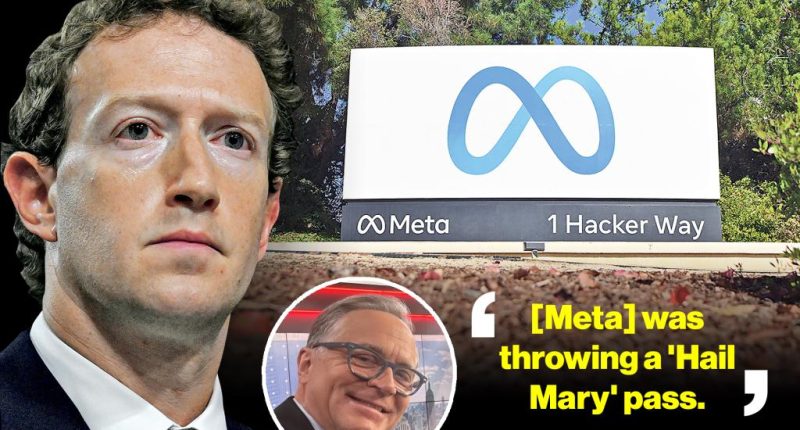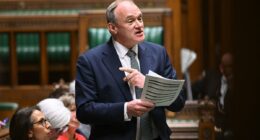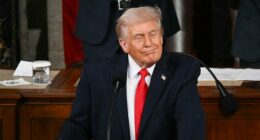Share this @internewscast.com

Meta reportedly encouraged an influential critic of Big Tech to support Mark Zuckerberg’s social media company as it aimed to gain favor with key Republicans before a major antitrust trial, The Post has discovered.
The Federal Trade Commission has charged Zuckerberg with implementing a “buy or bury” tactic to maintain a monopoly and is currently attempting in federal court to compel Meta to divest Instagram and WhatsApp. Last month, Zuckerberg became the initial witness to testify in the case.
In early April, right before the FTC trial commenced, a Meta representative contacted the Media Research Center, a notable conservative watchdog known for highlighting perceived issues of Big Tech censorship and political bias, according to multiple sources familiar with the conversation.
During the phone call with MRC executive Dan Schneider, the Meta official mentioned the upcoming FTC case and touted Zuckerberg’s recent move to eliminate its fact-checking unit – whose past role in alleged censorship had been widely criticized by Republicans – in favor of a more lenient “community notes” policy.
When reached by The Post, Schneider confirmed that the call had occurred. Schneider said he interpreted the outreach as Meta “nudging me to do something,” such as amplifying Meta’s new policy, to curry favor with conservatives.
“On the eve of this trial that could have severe ramifications for Meta, [the company official] was throwing a ‘hail Mary’ pass to see if one of its chief critics would run cover for them in some way,” Schneider said.
“It’s not accurate to say that [the official] asked me to do something,” Schneider said. “I think it’s clearly accurate that they were hoping I was going to do something.”
During the call, the Meta official suggested that the FTC could secure a more impactful deal “not at trial, but with something beforehand” – in an apparent reference to a settlement, Schneider said.
Meta declined to comment.
The phone call is the latest sign of an ongoing lobbying blitz by Zuckerberg and other Meta officials aimed at key Republicans, including President Trump himself.
“The timing from Meta shows how desperate they were to avoid a trial,” a DC source with direct knowledge with the company’s lobbying efforts told The Post. “It takes balls to turn down a nudge from them too — they could sink all your traffic.”
MRC has published several analyses and studies detailing alleged censorship by Google, Meta and other Big Tech firms – including an April 2024 report titled “39 Times Facebook Interfered in US Elections Since 2008.”
In a December report, MRC identified alleged suppression of information about the attempted assassination of President Trump last July by Meta, Google and Amazon as the worst censorship incident of the year.
“[Meta] was trying to nudge us and we did not take the bait. We did not oblige,” Schneider said. “While we appreciate the public statements and what seem to be steps in the right direction, that’s just the bare minimum.”
“Meta must make restitution for all of the media outlets that they hurt, that they economically harmed, unlawfully, and they’ve got to solidify these steps to support free speech rights,” Schneider added.
In late March, MRC put out a blog post noting it had seen “a substantial boost in traffic” since Meta changed its fact-checking policy, but questioned whether the changes were permanent or “merely a political stop-gap to curry favor amidst a swell of pro-free speech fervor.”
Meta was one of several Big Tech companies that sponsored the White House’s Easter Egg Roll on April 21. The social media giant had a physical booth at the event, staffed with multiple company operatives with GOP ties who used it as an opportunity to chat up GOP lawmakers.
Meta’s public policy team – lead by longtime GOP insider Joel Kaplan – has also made other attempts to connect with conservative influencers as it looks to garner more Republican support.
Last week, the conservative activist Robby Starbuck – who has sued Meta for defamation after its chatbot allegedly falsely claimed he participated in the Jan. 6 Capitol riot – shared a recent DM in which Meta operative Henry Rodgers, a Republican, asked him to “amplify” details of Meta’s revised community notes program.
After Starbuck’s lawsuit went public, Kaplan took the rare step of issuing a public apology, admitting in an X post that the chatbot’s responses were “unacceptable.”
“Meta has been running around DC desperately trying to place favorable op-eds in conservative outlets,” the DC source added. “They don’t understand that Republicans couldn’t care less about their troubles.”
Zuckerberg has personally visited the White House at least three times and even bought a $23 million mansion in Washington, DC to be closer to the administration.
Last month, the Wall Street Journal reported that Zuckerberg spoke directly with FTC Chairman Andrew Ferguson in a bid to settle the case. However, the billionaire initially offered just $450 million – a fraction of the $30 billion the FTC had demanded.
Zuckerberg eventually upped his offer to $1 billion, but Ferguson reportedly said he would not settle for anything less than $18 billion and a consent decree barring Meta from anticompetitive practices.

















